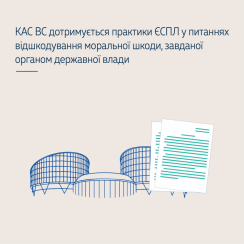Contact center of the Ukrainian Judiciary 044 207-35-46

Administrative Cassation Court within the Supreme Court has considered case on the acknowledgement of inactivity as unlawful and on the compensation of moral damage caused by a public authority; the Court has also concluded that circumstances provided by the plaintiff testified that he was morally damaged, and the compensation of this damage is the common practice of the European Court of Human Rights.
In the cases on the compensation of moral damage caused by a public authority or a local self-government body, a court shall establish, whether defendant’s actions (decisions, inactivity) have had negative impact and whether plaintiff’s negative emotions have reached the level of suffering or humiliation; the court also shall establish the causal relationship and determine the comparability of the compensation to the caused negative consequences.
In the ECHR case-law, human rights violations, which cause mental suffering, disappointment and inconvenience, particularly, through the violation of good governance principle, by state, are qualified as ones, which cause moral damage.
Taking into account this fact, psychological tension, disappointment and inconvenience, caused due to the violation of human rights by a public authority or a local self-government body, even if they have not resulted in grave consequences in the form of health deterioration, may testify the infliction of emotional distress.
The assessment of the moral damage level depends on all case circumstances, which testify the motives of unlawful actions, their intensity, duration, frequence, physical and mental consequences and, in some cases, the affected person’s sex, age, and health status. The moral damage shall be compensated regardless of the defendant’s guilt – a public authority or a local self-government body, and the unlawfulness of its actions and decisions shall be presumed – the burden of proof of their lawfulness shall be carried out by the defendant.
Taking into account these circumstances, the ACC SC has concluded that the plaintiff’s negative emotions because of continuous and intentional non-consideration of his application were in causal relationship with the defendant’s actions; thus, they caused him moral damage.
Therefore, the Supreme Court has agreed with the judgment of appeal court, pursuant to which the plaintiff had suffered from moral damage caused by continuous non-execution of a judgment by the defendant.
At the same time, the SC has rejected the arguments noted in the cassation appeal regarding the fact that the moral damage should be compensated to the plaintiff at the expense of the state represented by the State Treasury Service, but not at the expense of the defendant as a body of executive service; the SC has also remarked that the compensation might be carried out by the defendant as a public authority representing the state while performing public administrative functions by it.
Resolution of the Supreme Court of 24 March 2020 in the case No. 818/607/17 (administrative proceedings No. К/9901/17533/18) — http://www.reyestr.court.gov.ua/Review/88385320.